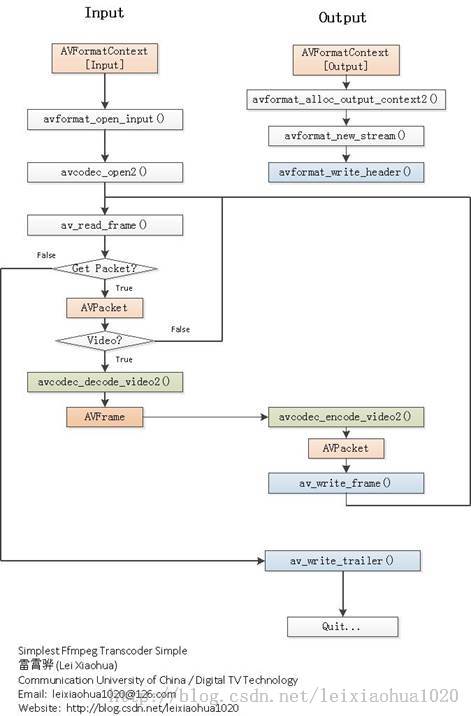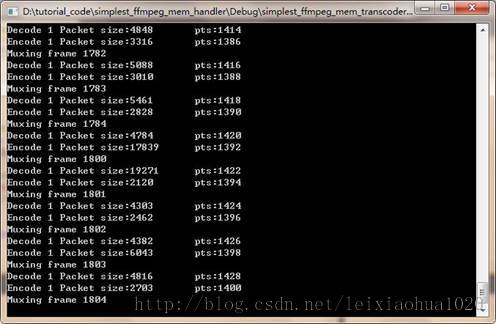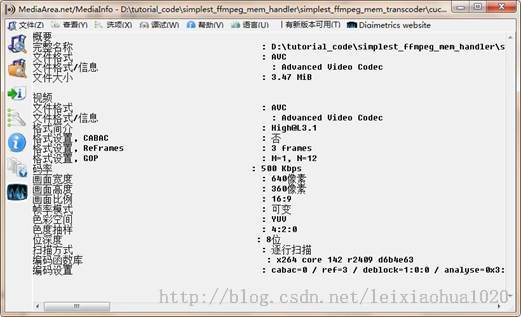最简单的基于FFmpeg的内存读写的例子:内存转码器
=====================================================
最简单的基于FFmpeg的内存读写的例子系列文章列表:
最简单的基于FFmpeg的内存读写的例子:内存播放器
最简单的基于FFmpeg的内存读写的例子:内存转码器
=====================================================
上篇文章记录了一个基于FFmpeg的内存播放器,可以使用FFmpeg读取并播放内存中的数据。这篇文章记录一个基于FFmpeg的内存转码器。该转码器可以使用FFmpeg读取内存中的数据,转码为H.264之后再将数据输出到内存。
关于如何从内存读取数据,以及如何将数据输出到内存,可以参考文章:ffmpeg 从内存中读取数据(或将数据输出到内存)
FFmpeg读写内存的关键点有2个:1. 初始化自定义的AVIOContext,指定自定义的回调函数。
2. 自己写回调函数。注意函数的参数和返回值(尤其是返回值)。
转码实际上就是解码和编码的结合。该方面的知识可以参考文章:
解码:100行代码实现最简单的基于FFMPEG+SDL的视频播放器(SDL1.x)
编码:最简单的基于FFMPEG的视频编码器(YUV编码为H.264)
转码: 最简单的基于FFMPEG的转码程序
流程
程序的流程图如下图所示。从图中可以看出,首先分别初始化了输入和输出的AVFormatContext。然后首先解码输入的AVPacket,得到存储像素数据(YUV420P格式)的AVFrame,然后编码AVFrame为H.264的AVPacket,最后将编码后的AVPacket输出。代码
下面直接贴上代码:/** * 最简单的基于FFmpeg的内存读写例子(内存转码器) * Simplest FFmpeg mem Transcoder * * 雷霄骅,张晖 * [email protected] * 中国传媒大学/数字电视技术 * Communication University of China / Digital TV Technology * http://blog.csdn.net/leixiaohua1020 * * 本程序实现了任意格式视频数据(例如MPEG2)转码为H.264码流数据。 * 本程序并不是对文件进行处理,而是对内存中的视频数据进行处理。 * 它从内存读取数据,并且将转码后的数据输出到内存中。 * 是最简单的使用FFmpeg读写内存的例子。 * * This software convert video bitstream (Such as MPEG2) to H.264 * bitstream. It read video bitstream from memory (not from a file), * convert it to H.264 bitstream, and finally output to another memory. * It's the simplest example to use FFmpeg to read (or write) from * memory. * */ #include <stdio.h> extern "C" { #include "libavcodec/avcodec.h" #include "libavformat/avformat.h" #include "libavutil/avutil.h" #include "libavutil/opt.h" #include "libavutil/pixdesc.h" }; FILE *fp_open; FILE *fp_write; //Read File int read_buffer(void *opaque, uint8_t *buf, int buf_size){ if(!feof(fp_open)){ int true_size=fread(buf,1,buf_size,fp_open); return true_size; }else{ return -1; } } //Write File int write_buffer(void *opaque, uint8_t *buf, int buf_size){ if(!feof(fp_write)){ int true_size=fwrite(buf,1,buf_size,fp_write); return true_size; }else{ return -1; } } int flush_encoder(AVFormatContext *fmt_ctx,unsigned int stream_index) { int ret; int got_frame; AVPacket enc_pkt; if (!(fmt_ctx->streams[stream_index]->codec->codec->capabilities & CODEC_CAP_DELAY)) return 0; while (1) { av_log(NULL, AV_LOG_INFO, "Flushing stream #%u encoder\n", stream_index); //ret = encode_write_frame(NULL, stream_index, &got_frame); enc_pkt.data = NULL; enc_pkt.size = 0; av_init_packet(&enc_pkt); ret = avcodec_encode_video2 (fmt_ctx->streams[stream_index]->codec, &enc_pkt, NULL, &got_frame); av_frame_free(NULL); if (ret < 0) break; if (!got_frame) {ret=0;break;} /* prepare packet for muxing */ enc_pkt.stream_index = stream_index; enc_pkt.dts = av_rescale_q_rnd(enc_pkt.dts, fmt_ctx->streams[stream_index]->codec->time_base, fmt_ctx->streams[stream_index]->time_base, (AVRounding)(AV_ROUND_NEAR_INF|AV_ROUND_PASS_MINMAX)); enc_pkt.pts = av_rescale_q_rnd(enc_pkt.pts, fmt_ctx->streams[stream_index]->codec->time_base, fmt_ctx->streams[stream_index]->time_base, (AVRounding)(AV_ROUND_NEAR_INF|AV_ROUND_PASS_MINMAX)); enc_pkt.duration = av_rescale_q(enc_pkt.duration, fmt_ctx->streams[stream_index]->codec->time_base, fmt_ctx->streams[stream_index]->time_base); av_log(NULL, AV_LOG_DEBUG, "Muxing frame\n"); /* mux encoded frame */ ret = av_write_frame(fmt_ctx, &enc_pkt); if (ret < 0) break; } return ret; } int main(int argc, char* argv[]) { int ret; AVFormatContext* ifmt_ctx=NULL; AVFormatContext* ofmt_ctx=NULL; AVPacket packet,enc_pkt; AVFrame *frame = NULL; enum AVMediaType type; unsigned int stream_index; unsigned int i=0; int got_frame,enc_got_frame; AVStream *out_stream; AVStream *in_stream; AVCodecContext *dec_ctx, *enc_ctx; AVCodec *encoder; fp_open = fopen("cuc60anniversary_start.ts", "rb"); //视频源文件 fp_write=fopen("cuc60anniversary_start.h264","wb+"); //输出文件 av_register_all(); ifmt_ctx=avformat_alloc_context(); avformat_alloc_output_context2(&ofmt_ctx, NULL, "h264", NULL); unsigned char* inbuffer=NULL; unsigned char* outbuffer=NULL; inbuffer=(unsigned char*)av_malloc(32768); outbuffer=(unsigned char*)av_malloc(32768); /*open input file*/ AVIOContext *avio_in =avio_alloc_context(inbuffer, 32768,0,NULL,read_buffer,NULL,NULL); if(avio_in==NULL) goto end; ifmt_ctx->pb=avio_in; ifmt_ctx->flags=AVFMT_FLAG_CUSTOM_IO; if ((ret = avformat_open_input(&ifmt_ctx, "whatever", NULL, NULL)) < 0) { av_log(NULL, AV_LOG_ERROR, "Cannot open input file\n"); return ret; } if ((ret = avformat_find_stream_info(ifmt_ctx, NULL)) < 0) { av_log(NULL, AV_LOG_ERROR, "Cannot find stream information\n"); return ret; } for (i = 0; i < ifmt_ctx->nb_streams; i++) { AVStream *stream; AVCodecContext *codec_ctx; stream = ifmt_ctx->streams[i]; codec_ctx = stream->codec; /* Reencode video & audio and remux subtitles etc. */ if (codec_ctx->codec_type == AVMEDIA_TYPE_VIDEO){ /* Open decoder */ ret = avcodec_open2(codec_ctx, avcodec_find_decoder(codec_ctx->codec_id), NULL); if (ret < 0) { av_log(NULL, AV_LOG_ERROR, "Failed to open decoder for stream #%u\n", i); return ret; } } } //av_dump_format(ifmt_ctx, 0, "whatever", 0); /*open output file*/ AVIOContext *avio_out =avio_alloc_context(outbuffer, 32768,1,NULL,NULL,write_buffer,NULL); if(avio_out==NULL) goto end; //avio_out->write_packet=write_packet; ofmt_ctx->pb=avio_out; ofmt_ctx->flags=AVFMT_FLAG_CUSTOM_IO; for (i = 0; i < 1; i++) { out_stream = avformat_new_stream(ofmt_ctx, NULL); if (!out_stream) { av_log(NULL, AV_LOG_ERROR, "Failed allocating output stream\n"); return AVERROR_UNKNOWN; } in_stream = ifmt_ctx->streams[i]; dec_ctx = in_stream->codec; enc_ctx = out_stream->codec; if (dec_ctx->codec_type == AVMEDIA_TYPE_VIDEO) { encoder = avcodec_find_encoder(AV_CODEC_ID_H264); enc_ctx->height = dec_ctx->height; enc_ctx->width = dec_ctx->width; enc_ctx->sample_aspect_ratio = dec_ctx->sample_aspect_ratio; enc_ctx->pix_fmt = encoder->pix_fmts[0]; enc_ctx->time_base = dec_ctx->time_base; //enc_ctx->time_base.num = 1; //enc_ctx->time_base.den = 25; //H264的必备选项,没有就会错 enc_ctx->me_range=16; enc_ctx->max_qdiff = 4; enc_ctx->qmin = 10; enc_ctx->qmax = 51; enc_ctx->qcompress = 0.6; enc_ctx->refs=3; enc_ctx->bit_rate = 500000; ret = avcodec_open2(enc_ctx, encoder, NULL); if (ret < 0) { av_log(NULL, AV_LOG_ERROR, "Cannot open video encoder for stream #%u\n", i); return ret; } } else if (dec_ctx->codec_type == AVMEDIA_TYPE_UNKNOWN) { av_log(NULL, AV_LOG_FATAL, "Elementary stream #%d is of unknown type, cannot proceed\n", i); return AVERROR_INVALIDDATA; } else { /* if this stream must be remuxed */ ret = avcodec_copy_context(ofmt_ctx->streams[i]->codec, ifmt_ctx->streams[i]->codec); if (ret < 0) { av_log(NULL, AV_LOG_ERROR, "Copying stream context failed\n"); return ret; } } if (ofmt_ctx->oformat->flags & AVFMT_GLOBALHEADER) enc_ctx->flags |= CODEC_FLAG_GLOBAL_HEADER; } //av_dump_format(ofmt_ctx, 0, "whatever", 1); /* init muxer, write output file header */ ret = avformat_write_header(ofmt_ctx, NULL); if (ret < 0) { av_log(NULL, AV_LOG_ERROR, "Error occurred when opening output file\n"); return ret; } i=0; /* read all packets */ while (1) { i++; if ((ret = av_read_frame(ifmt_ctx, &packet)) < 0) break; stream_index = packet.stream_index; if(stream_index!=0) continue; type = ifmt_ctx->streams[packet.stream_index]->codec->codec_type; av_log(NULL, AV_LOG_DEBUG, "Demuxer gave frame of stream_index %u\n", stream_index); av_log(NULL, AV_LOG_DEBUG, "Going to reencode the frame\n"); frame = av_frame_alloc(); if (!frame) { ret = AVERROR(ENOMEM); break; } packet.dts = av_rescale_q_rnd(packet.dts, ifmt_ctx->streams[stream_index]->time_base, ifmt_ctx->streams[stream_index]->codec->time_base, (AVRounding)(AV_ROUND_NEAR_INF|AV_ROUND_PASS_MINMAX)); packet.pts = av_rescale_q_rnd(packet.pts, ifmt_ctx->streams[stream_index]->time_base, ifmt_ctx->streams[stream_index]->codec->time_base, (AVRounding)(AV_ROUND_NEAR_INF|AV_ROUND_PASS_MINMAX)); ret = avcodec_decode_video2(ifmt_ctx->streams[stream_index]->codec, frame, &got_frame, &packet); printf("Decode 1 Packet\tsize:%d\tpts:%d\n",packet.size,packet.pts); if (ret < 0) { av_frame_free(&frame); av_log(NULL, AV_LOG_ERROR, "Decoding failed\n"); break; } if (got_frame) { frame->pts = av_frame_get_best_effort_timestamp(frame); frame->pict_type=AV_PICTURE_TYPE_NONE; enc_pkt.data = NULL; enc_pkt.size = 0; av_init_packet(&enc_pkt); ret = avcodec_encode_video2 (ofmt_ctx->streams[stream_index]->codec, &enc_pkt, frame, &enc_got_frame); printf("Encode 1 Packet\tsize:%d\tpts:%d\n",enc_pkt.size,enc_pkt.pts); av_frame_free(&frame); if (ret < 0) goto end; if (!enc_got_frame) continue; /* prepare packet for muxing */ enc_pkt.stream_index = stream_index; enc_pkt.dts = av_rescale_q_rnd(enc_pkt.dts, ofmt_ctx->streams[stream_index]->codec->time_base, ofmt_ctx->streams[stream_index]->time_base, (AVRounding)(AV_ROUND_NEAR_INF|AV_ROUND_PASS_MINMAX)); enc_pkt.pts = av_rescale_q_rnd(enc_pkt.pts, ofmt_ctx->streams[stream_index]->codec->time_base, ofmt_ctx->streams[stream_index]->time_base, (AVRounding)(AV_ROUND_NEAR_INF|AV_ROUND_PASS_MINMAX)); enc_pkt.duration = av_rescale_q(enc_pkt.duration, ofmt_ctx->streams[stream_index]->codec->time_base, ofmt_ctx->streams[stream_index]->time_base); av_log(NULL, AV_LOG_INFO, "Muxing frame %d\n",i); /* mux encoded frame */ av_write_frame(ofmt_ctx,&enc_pkt); if (ret < 0) goto end; } else { av_frame_free(&frame); } av_free_packet(&packet); } /* flush encoders */ for (i = 0; i < 1; i++) { /* flush encoder */ ret = flush_encoder(ofmt_ctx,i); if (ret < 0) { av_log(NULL, AV_LOG_ERROR, "Flushing encoder failed\n"); goto end; } } av_write_trailer(ofmt_ctx); end: av_freep(avio_in); av_freep(avio_out); av_free(inbuffer); av_free(outbuffer); av_free_packet(&packet); av_frame_free(&frame); avformat_close_input(&ifmt_ctx); avformat_free_context(ofmt_ctx); fcloseall(); if (ret < 0) av_log(NULL, AV_LOG_ERROR, "Error occurred\n"); return (ret? 1:0); }
结果
程序运行的结果如下图所示。
转码前的视频信息使用MediaInfo查看如下图所示。
转码后的视频信息使用MediaInfo查看如下图所示。
下载
simplest ffmpeg mem handler
项目主页
SourceForge:https://sourceforge.net/projects/simplestffmpegmemhandler/
Github:https://github.com/leixiaohua1020/simplest_ffmpeg_mem_handler
开源中国:http://git.oschina.net/leixiaohua1020/simplest_ffmpeg_mem_handler
http://download.csdn.net/detail/leixiaohua1020/8003731
本工程包含两个FFmpeg读写内存的例子:
simplest_ffmpeg_mem_player:基于FFmpeg的内存播放器。
simplest_ffmpeg_mem_transcoder:基于FFmpeg的内存转码器。
更新-1.1 (2015.2.13)=========================================
这次考虑到了跨平台的要求,调整了源代码。经过这次调整之后,源代码可以在以下平台编译通过:
VC++:打开sln文件即可编译,无需配置。
cl.exe:打开compile_cl.bat即可命令行下使用cl.exe进行编译,注意可能需要按照VC的安装路径调整脚本里面的参数。编译命令如下。
::VS2010 Environment call "D:\Program Files\Microsoft Visual Studio 10.0\VC\vcvarsall.bat" ::include @set INCLUDE=include;%INCLUDE% ::lib @set LIB=lib;%LIB% ::compile and link cl simplest_ffmpeg_mem_transcoder.cpp /link avcodec.lib avformat.lib avutil.lib ^ avdevice.lib avfilter.lib postproc.lib swresample.lib swscale.lib /OPT:NOREF
MinGW:MinGW命令行下运行compile_mingw.sh即可使用MinGW的g++进行编译。编译命令如下。
g++ simplest_ffmpeg_mem_transcoder.cpp -g -o simplest_ffmpeg_mem_transcoder.exe \ -I /usr/local/include -L /usr/local/lib \ -lavcodec -lavformat -lavutil -lavdevice -lavfilter -lpostproc -lswresample -lswscale
GCC:Linux或者MacOS命令行下运行compile_gcc.sh即可使用GCC进行编译。编译命令如下。
gcc simplest_ffmpeg_mem_transcoder.cpp -g -o simplest_ffmpeg_mem_transcoder.out \ -I /usr/local/include -L /usr/local/lib \ -lavcodec -lavformat -lavutil -lavdevice -lavfilter -lpostproc -lswresample -lswscale
PS:相关的编译命令已经保存到了工程文件夹中
CSDN下载地址: http://download.csdn.net/detail/leixiaohua1020/8445795
SourceForge上已经更新。



